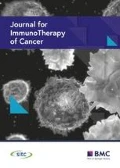In cancer patients, anti-tumor functions of NK cells are severely impaired by a variety of immunosuppressive mechanisms. Interleukin (IL)-2 and -15 are two essential cytokines regulating the development and function of human natural killer (NK) cells. Here, we compared the role of IL-2 and IL-15 to render resistance of human NK cells to tumor-induced suppression. We found that early-passage melanoma tumor cells strongly inhibited functions of IL-2 activated NK cells through production of prostaglandin E2 (PGE2). Under the same condition, IL-15 activated NK cells could significantly retain the ability to proliferate in vitro durability, in comparison to IL-2-expanded cells. Altogether, our study uncovers distinct properties between IL-2 and IL-15 on primary human NK cells under tumor-induced suppression. It provides evidence that implementation of IL-15 may greatly improve the clinical efficacy of adoptive NK cell therapy for the treatment of human cancers.
Author information
Authors and Affiliations
Rights and permissions
This article is published under an open access license. Please check the 'Copyright Information' section either on this page or in the PDF for details of this license and what re-use is permitted. If your intended use exceeds what is permitted by the license or if you are unable to locate the licence and re-use information, please contact the Rights and Permissions team.
About this article
Cite this article
Lundqvist, A., Mao, Y., Zhang, X. et al. Interleukin-15 potentiates human natural killer cells to resist tumor-induced suppression through mTOR-regulated metabolic control. j. immunotherapy cancer 3 (Suppl 2), P232 (2015). https://doi.org/10.1186/2051-1426-3-S2-P232
Published:
DOI: https://doi.org/10.1186/2051-1426-3-S2-P232

